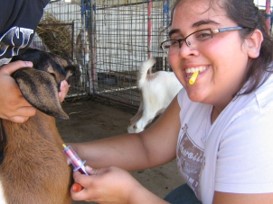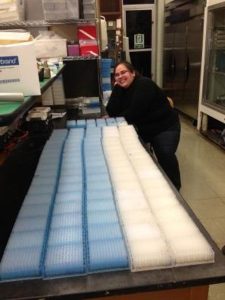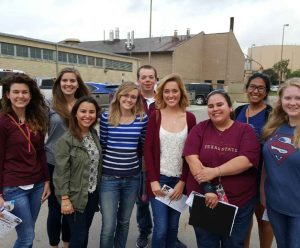Elizabeth Benavides learned several important lessons as she worked toward her PhD in animal sciences at the University of Missouri – although she admitted a few of those lessons were more fun than others.

Benavides participated in a couple of different research projects while at Mizzou. She said her research didn’t always go to plan.
“Honestly, my research resulted in quite a bit of failure,” Benavides said. “But that’s part of the research experience and part of the learning process. I didn’t end up with any major research papers or crazy findings. What I did learn, though, was how to persevere in the face of failure.”
Mizzou wasn’t originally on Benavides’ radar when she was searching for PhD programs. She earned her bachelor’s degree in agriculture and her master’s degree in animal science, both from Texas A&M University-Kingsville. While completing her master’s degree, Benavides made the decision to pursue her PhD. She was set on attending Colorado State University but was encouraged to apply to a few other universities as well. She had collaborated with University of Missouri professors during her master’s research and decided to reach out about potential projects.
“During my interview at MU, I felt an instant connection,” Benavides said. “There was an instant rapport and it seemed like such a natural fit. At that moment, everything got thrown on its head. I switched courses and made the decision to attend Mizzou.”
Benavides’ projects at Mizzou focused on developing methods of measuring multiple products in livestock blood samples simultaneously. She worked with a variety of technologies throughout her research.
“There was a lot of troubleshooting for sure,” Benavides said. “We were trying new things that really didn’t have a reference for us to pull from. While we did encounter some problems, we did see some successes, which were really exciting.”
Benavides grew up in the Dallas suburbs and developed a passion for animals at a young age. She had a goal of becoming a veterinarian and chose the pre-veterinary track at Texas A&M University-Kingsville when she began her collegiate career. She quickly learned, though, that path wasn’t quite right for her.
“I wasn’t sure which direction I wanted to go,” Benavides said. “One of my professors offered me an opportunity in their laboratory, and I decided to take a chance on it. I’m so glad I made the decision to jump into research, as I found something that I was very passionate about.”

Benavides said her master’s work was a transformative experience. She gained vital hands-on learning experiences, specifically with goats, that showcased a different side of animal sciences – one that she hadn’t seen before. She soon became an expert at collecting blood and tissue samples from a variety of livestock species.
It was during that time that Benavides also realized she had an interest in teaching.
“I was a teaching assistant for a course and one of the students was struggling a bit,” Benavides said. “During one class period we were out at the farm, and I worked a lot with this student on blood collection and sampling processes. He got the hang of it after a bit and was in awe of his accomplishment. He was telling all of his friends that they needed to have me help them as well. It was incredibly rewarding to play a role in that. I knew then that I wanted to help connect students with animals.”
After earning her PhD from MU in 2015, Benavides immediately began her teaching career at Texas State University, where she was hired as an assistant professor of animal science. She taught a handful of animal science courses and also advised pre-veterinary students at Texas State.
“Each lesson I learned ended up being integral for me as I made the transition from student to professor,” Benavides said. “I was able to connect to my students in a really unique way with my previous experiences, sharing with them how they can face their problems head on when things aren’t going their way. That was really exciting as an early-career professor fresh out of school.”
Benavides has continued to share the important lessons she learned with her students. After seven years at Texas State, Benavides recently made the move to Warren Wilson College, located in Swannanoa, North Carolina, and is serving as an assistant professor of animal science. She is still advising pre-vet students, too.
“Everything I’ve learned along the way has set me up so well for this opportunity,” Benavides said. “I’m excited to jump into this job and build relationships with a new group of students.”
While Benavides said that building relationships with students through the lessons she learned as a researcher has been vital, she’s also been able to connect with some of them through her experiences as a first generation college student.
“It took me a couple of years to figure out college and what it takes to make the experience a successful one,” Benavides said. “I was blind to a lot of things. As I reflect on it now, it was an intimidating experience at times. However, I’m glad to be able to help guide current first generation students as they try to navigate college like I once did.”

Benavides said she is also passionate about helping students find places where they can find a sense of belonging. She joined the Delta Pi Epsilon sorority at Texas A&M University-Kingsville, which allowed her to build friendships and relationships with others. Benavides was also part of the Latinx Graduate and Professional Network (LGPN) at Mizzou, where she found other MU students to share her heritage and culture with. Rocio Rivera, a professor in the Division of Animal Sciences, serves as the faculty advisor for LGPN.
“Coming to Mizzou was a bit of a culture shock for me,” Benavides said. “Kingsville is a predominantly Hispanic campus, so I did feel isolated at times at MU. The professional network really helped me find people who understand those circumstances. It felt like home.”
Benavides said those combined experiences have been extremely important as she guides the next generation of potential researchers or professors. She added that she understands her role as a Hispanic female in STEM, too.
“I definitely want to see more Hispanic females in the science fields,” Benavides said. “It’s so important to have that representation. We have to be out there, showing that we fit in this world. I want to do anything I can to encourage that next generation that they belong and can do this.”